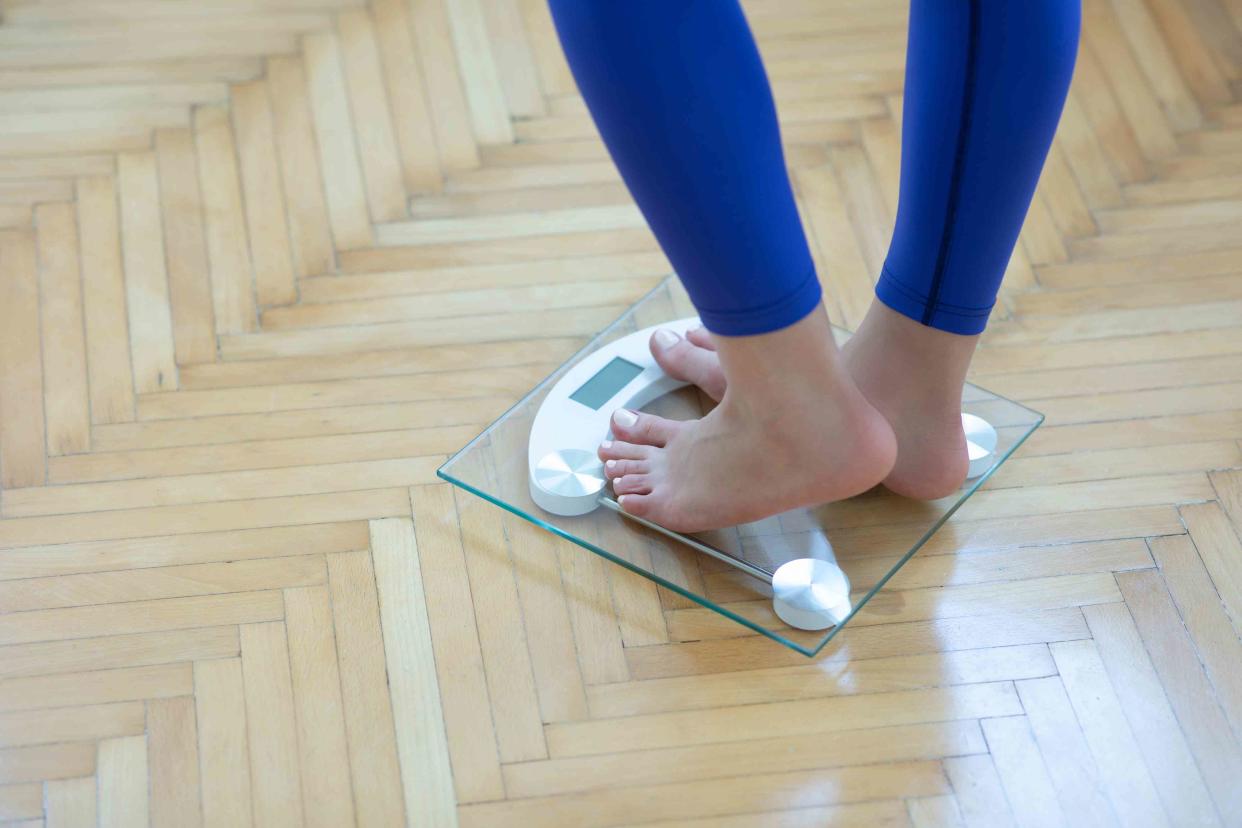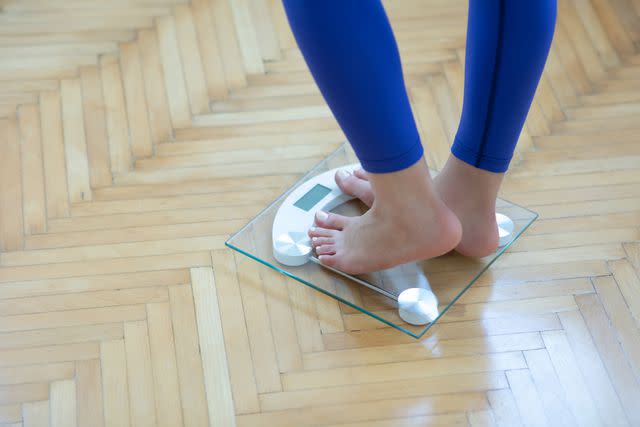Endometriosis and Weight Gain

bymuratdeniz / Getty Images
Endometriosis is a common gynecologic condition in which tissue similar to the lining of the uterus grows in other places in the body outside the uterus. Its primary symptoms include pelvic pain, infertility, and irregular periods. Other symptoms can consist of digestive or gastrointestinal symptoms or fatigue.
While little research points to endometriosis as a cause of weight gain in women, it can cause hormonal imbalances associated with weight changes.
This article discusses the link between endometriosis and weight gain and strategies to manage weight with this condition.

bymuratdeniz / Getty Images
Does Endometriosis Cause Weight Gain?
Medical literature suggests that endometriosis is inversely related to body mass index (BMI). This means that lower body weight is associated with endometriosis, and higher body weight is associated with a decreased risk of endometriosis.
Less is known about weight changes caused by the disease. No evidence supports the claim that endometriosis directly causes weight gain. In fact, the opposite may be true. Many people diagnosed with endometriosis complain of weight loss as a symptom. Experts suggest that metabolic changes due to endometriosis may lead to decreased weight.
Potential Causes of Weight Gain
While research isn't clear about how endometriosis can cause weight gain, some people diagnosed with endometriosis may report weight fluctuations. There are various potential causes of weight changes with endometriosis.
Hormonal Imbalance
Endometriosis is highly estrogen-dependent, meaning the hormone estrogen significantly impacts the growth and symptoms of the disease. People with endometriosis tend to have very high estrogen levels, which can cause a hormonal imbalance. Your hormones play a role in regulating your menstrual cycle, mood, energy, and weight.
Medication for Endometriosis
Typically, hormone therapy is medication, such as birth control, used to treat the symptoms of endometriosis. Hormone treatments work by stopping the production of hormones and slowing the growth of endometrial tissues.
Since hormone therapy can alter the body's normal cycle of hormone production, it can send the body into a "menopausal state," stopping or reducing the menstrual cycle. Hormone therapy may also cause side effects such as weight gain, bloating, or bleeding between periods.
Hysterectomy for Endometriosis Treatment
Hysterectomy (surgical removal of the uterus) is a last-resort treatment for endometriosis that removes the uterus to reduce persistent pain. Sometimes the fallopian tubes and ovaries may also be removed, which will induce menopause. Weight gain, especially around the waist, is a common symptom of surgical or nonsurgical menopause.
Endometriosis and Bloating
Abdominal bloating, or "endo belly," is a common symptom for people diagnosed with endometriosis. Compared to women without endometriosis, women with endometriosis experience much more discomfort, severe bloating, and changes in lower abdominal girth across the menstrual cycle.
In addition to abdominal bloating, some women report swelling in the hands, legs, or feet as a symptom.
"Endo belly" is a term used to describe severe abdominal bloating and discomfort associated with endometriosis. The cause of endo belly varies from person to person, but inflammation, gut health, and medications can contribute. People who experience endo belly often report "looking pregnant" from the severe bloating.
How Endometriosis Pain May Lead to Weight Gain
While endometriosis may not directly lead to weight gain, the pain caused by the disease can reduce your ability to enjoy movement or exercise, which helps to maintain your physical health. Chronic pain can have many adverse effects, including a sedentary lifestyle, poor sleep, overeating, and an overall lower quality of life.
Is it Harder to Lose Weight With Endometriosis?
Endometriosis can make it difficult to lose weight, both directly and indirectly. Hormone imbalances or medications that alter hormone levels can interfere with your metabolism and impact your ability to lose weight. Further, chronic pain, discomfort, swelling, or bloating caused by the disease can affect your mood and motivation to exercise.
Losing Weight With Endometriosis
Aside from medical and surgical interventions, diet and exercise can also play a role in managing pain and weight changes associated with endometriosis.
Endometriosis Diet
While there is little evidence of one specific diet providing more benefits than another, consuming an overall healthy diet can improve symptoms of endometriosis. An overall healthy diet is rich in the following:
Vegetables
Fruit
Legumes (beans, lentils, peas)
Nuts
Fish
Whole-grain products
Low-fat dairy
Minimizing red meat, alcoholic and sugar-sweetened drinks, salt, and saturated fatty acids contributes to a healthy diet. Limiting or avoiding certain nutrients such as gluten, dairy, soy, sugar, and coffee was self-reported to alleviate endometriosis symptoms.
Physical Activity
While physical activity can seem daunting when dealing with chronic pain and discomfort, research suggests some benefits. Physical exercise may have anti-inflammatory effects, help to reduce symptoms and pain intensity, elevate mood, and decrease stress levels.
Alternative Treatment Options
Alternative treatment options for endometriosis include:
Herbs
Microwave physiotherapy
Xiao Yao San (Chinese herbal medicine enema)
Psychological interventions
Research is limited on alternative treatments for managing symptoms of endometriosis. However, these treatments are usually suggested as complementary and are widely accepted to be generally safe with fewer adverse effects than traditional medical or surgical interventions.
When to Talk to a Healthcare Provider
Talk with a healthcare provider if your endometriosis is causing uncontrollable weight gain and affecting your quality of life. Your provider can support you in discussing options for managing your weight when you have endometriosis.
Summary
Endometriosis is a chronic condition that causes symptoms such as severe abdominal pain, irregular menstruation, and infertility. Some people report weight gain as a symptom of endometriosis, which may be attributed to abdominal bloating or treatments for the disease. Pain may indirectly contribute to weight gain.
While diet and physical activity can help manage weight changes caused by endometriosis symptoms, discuss alternative options or changes to your treatment with a healthcare provider.

